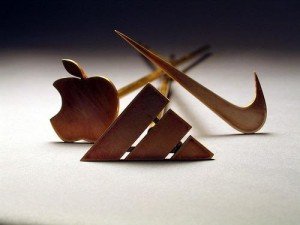Last week I attended the Triangle AMA CMO panel, a great event with four Chief Marketing Officers from SAS, Concord Hospitality, Cheerwine and Genworth Financial. One of the presenters, Jim Davis, SAS CMO, said something that really hit home. Jim stated that your company’s brand is not the logo but what is felt and the customers’ reaction. I could not agree with him more and so many times I find the wrong use of brand terminology and the true meaning.
 I hear many times a request to, “put more branding,” on a marketing piece or campaign. This conjures up an image of me getting my iron brand fired up in my workshop so I can “brand” what ever physical piece I can get my hand on. Word of advice, doing this to your monitor will ruin it so don’t try this at home. For more about how I dislike corporate America creating non-words that make me feel like at 18th century blacksmith, see my post on “wordsmithing.”
I hear many times a request to, “put more branding,” on a marketing piece or campaign. This conjures up an image of me getting my iron brand fired up in my workshop so I can “brand” what ever physical piece I can get my hand on. Word of advice, doing this to your monitor will ruin it so don’t try this at home. For more about how I dislike corporate America creating non-words that make me feel like at 18th century blacksmith, see my post on “wordsmithing.”
Modern corporate culture always takes great concepts and turns them into buzzwords and verbs. Personally I don’t feel like you “brand” anything or apply “branding.” Many reference sites will tell you that a brand exists because there is a logo and a company that offers the brand’s product or service. These are brand names and brand identity. Going back to what Jim Davis said, “a brand is felt.”
Most of modern branding research is based on consumer brands. Surveys and focus groups of loyal customers will tell researchers how they love the brand for various reasons. Most will focus around quality, consistency and value. These are what comprise a brand promise. Consumers will come to expect these values when purchasing and engaging with brand products and services and will let you know when they do not met expectations or fail to deliver. When asked to recommend a product or service a trusted friend or coworker will express these feelings.
Being in the services industry, brand development takes on a whole new approach. My company offers business analytics consulting services and I am constantly telling our consultants that their actions are our brand. How they dress, communicate and deliver on projects is the feelings that the customer will experience and communicate back to us, our partners and potential new clients. It’s important for our solutions to work and the people that create and deliver them to provide a sense of security and trust. No matter how much creative marketing I do to communicate my company’s brand values, it is up to each and every consultant to deliver on that value on every project. If this fails to happen then the brand value is tarnished and requires attention to rebuilding the customer’s perception of our brand.
And that’s what it’s all about, trust. We hear a lot about trust these days, from government, financial institutions, family and technology. Privacy concerns are stemming from all the information being posted to social networks. Consumers trust big institutions less and less as well as our federal government. But yet we continue to trust our brands to provide the value and level of satisfaction we’ve become accustomed to receiving. In doing this they build upon the brand promise and reaffirm the customer’s purchasing decision.
That’s why brands have become so important in our life. The feelings and trust we associate with our favorite products and services give us a comfort level. And it’s not just consumer products; business brands play a vital role in our life. From laptops and mobile phones to paper and office furniture, we expect our business brands to perform at higher levels than our personal brands. And why not, they frequently are dramatically more expensive.
What is your definition of a brand? Is it the logo or commercial or how you feel when interacting with the brand, its representatives and partners? Do you think adding a logo to a marketing piece is branding?


